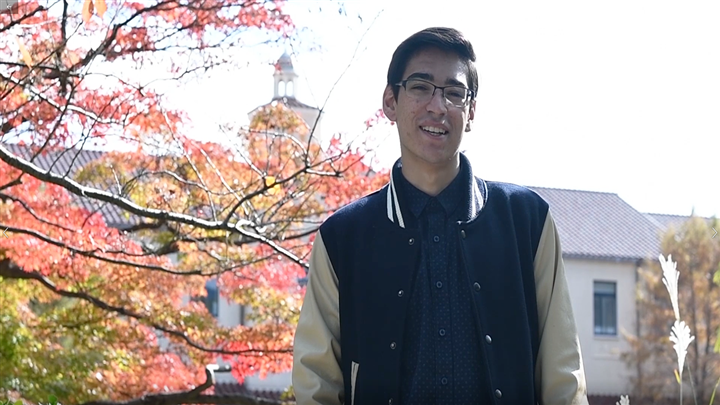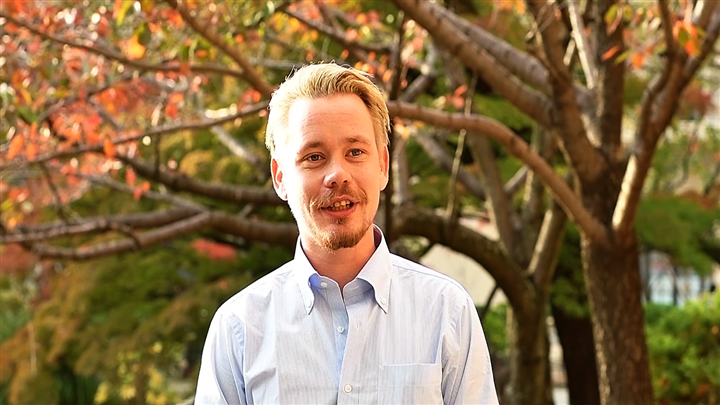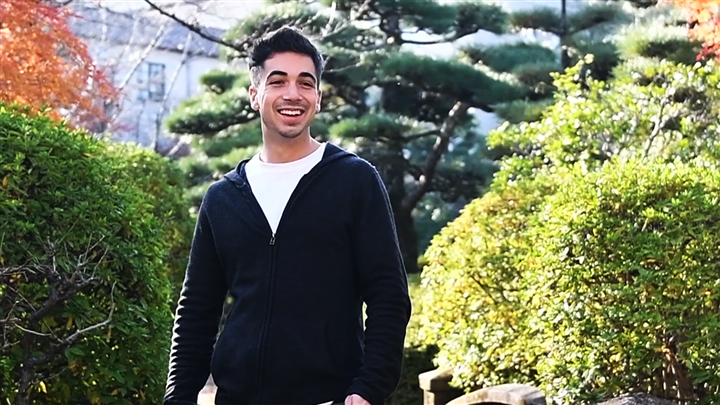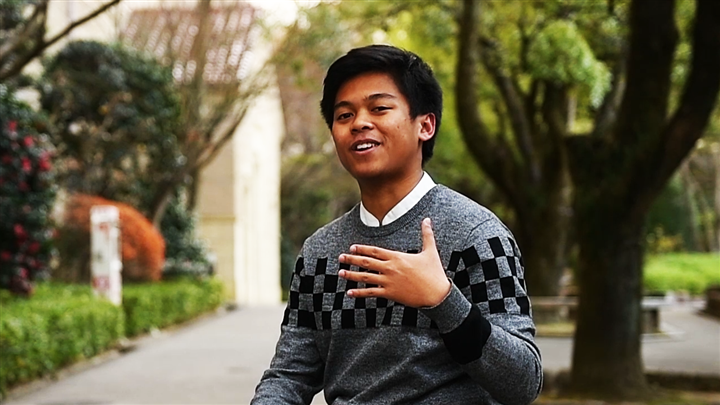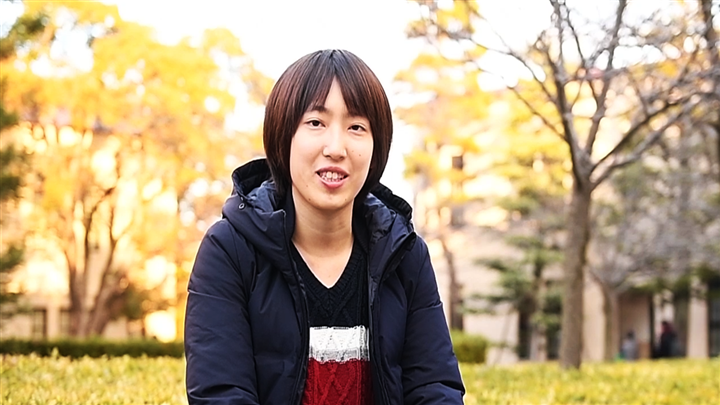- TOP
- Campus Life
- Studentsʼ Voices Top Page
- International Activities
- Lukas Schwartz, University of Dusseldorf

Students' Voices
Lukas Schwartz, University of Dusseldorf(Germany)
2019.11.27
Public Relations Office
Choosing KGU
Lukas Schwartz, University of Dusseldorf
Could you tell me why you chose to come on the exchange program here at KGU?
I’ve been studying Japanese for five years now, and it’s my fourth time in Japan already. I chose KGU because I have a really good friend in the master program at KGU, and when I went to Kansai two years ago, she showed me the university and it’s really pretty. I like Kansai the most in Japan, so I chose this university.
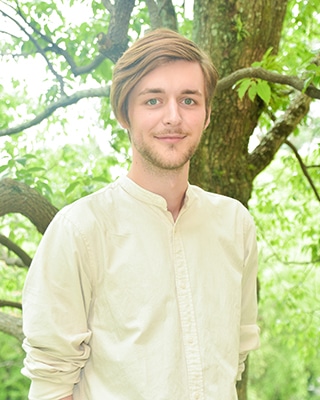
I saw you serve as the MC at the Japanese Speech Show a couple weeks ago.
Did you come to that? (laughs)
What was that experience like?
I was confused in the beginning because the teacher came to me and said, “I talked to the other instructors and we all thought you should do it,” and I said “Why me?” (laughs) They said, “You seem to have no problem getting attention.” I don’t know if that’s good or bad. Maybe it was also because of my Japanese level, and because I’m not shy. I wanted to say no at first, but then they all trusted me to do it, so I figured, why not. It was fun, it was a good experience. I think giving a speech would be easier for me, because as the MC, I had to listen to the speeches and give comments, so I was a bit afraid I wouldn’t know what to say.
What level did you test into when you came? How are the language classes?
I was in Level 5 (CEFR B1-B2/JLPT N2) when I came, and now I’m in Level 6 (CEFR B2-C1/JLPT N1). We’re reading lots of articles, so I get to know a lot of social issues. The content is really interesting because I want to work in Japan after graduating, so hearing about social problems and the emphasis on where you went to school, and about job hunting, it’s quite interesting. In these levels, most of the students are Asian, so Europeans and Americans stand out a bit more. I think that some of them are not used to speaking Japanese in their private lives, like with friends or outside university, so that’s maybe an advantage I have, while their advantage is that they studied Japanese with textbooks from the beginning, but I didn’t. I just had to speak Japanese to the people around me because they didn’t speak English or German. Even in Germany, I usually speak Japanese every day.
Are you staying with a host family?
Yes, in Amagasaki. The reason I chose to stay with a host family is because I’m not good at cooking (laughs) and I don’t like being in one single room. I wanted my own room, but also a living room and kitchen. I thought it would be more fun, too, because you always eat together with other people. You can always speak Japanese and when you don’t know how something works, you can ask them for help. My host mom took me to a lot of places in Kyoto, too.
On KGU Student Life
Lukas Schwartz, University of Dusseldorf
Could you tell me why you chose to come on the exchange program here at KGU?
I’ve been studying Japanese for five years now, and it’s my fourth time in Japan already. I chose KGU because I have a really good friend in the master program at KGU, and when I went to Kansai two years ago, she showed me the university and it’s really pretty. I like Kansai the most in Japan, so I chose this university.
I saw you serve as the MC at the Japanese Speech Show a couple weeks ago.
Did you come to that? (laughs)
What was that experience like?
I was confused in the beginning because the teacher came to me and said, “I talked to the other instructors and we all thought you should do it,” and I said “Why me?” (laughs) They said, “You seem to have no problem getting attention.” I don’t know if that’s good or bad. Maybe it was also because of my Japanese level, and because I’m not shy. I wanted to say no at first, but then they all trusted me to do it, so I figured, why not. It was fun, it was a good experience. I think giving a speech would be easier for me, because as the MC, I had to listen to the speeches and give comments, so I was a bit afraid I wouldn’t know what to say.
What level did you test into when you came? How are the language classes?
I was in Level 5 (CEFR B1-B2/JLPT N2) when I came, and now I’m in Level 6 (CEFR B2-C1/JLPT N1). We’re reading lots of articles, so I get to know a lot of social issues. The content is really interesting because I want to work in Japan after graduating, so hearing about social problems and the emphasis on where you went to school, and about job hunting, it’s quite interesting. In these levels, most of the students are Asian, so Europeans and Americans stand out a bit more. I think that some of them are not used to speaking Japanese in their private lives, like with friends or outside university, so that’s maybe an advantage I have, while their advantage is that they studied Japanese with textbooks from the beginning, but I didn’t. I just had to speak Japanese to the people around me because they didn’t speak English or German. Even in Germany, I usually speak Japanese every day.
Are you staying with a host family?
Yes, in Amagasaki. The reason I chose to stay with a host family is because I’m not good at cooking (laughs) and I don’t like being in one single room. I wanted my own room, but also a living room and kitchen. I thought it would be more fun, too, because you always eat together with other people. You can always speak Japanese and when you don’t know how something works, you can ask them for help. My host mom took me to a lot of places in Kyoto, too.
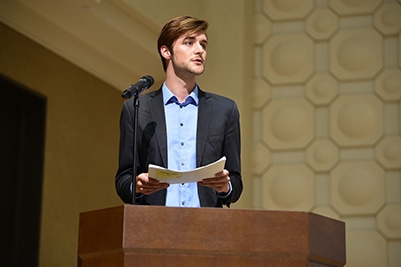
Serving as MC at the Speech Contest for international students
Future Aspirations and Advice for Prospective Students
As someone who’s finishing the program, what would you say to someone who was thinking about studying here at KGU? What advice would you give them?
Definitely make Japanese friends. Don’t be afraid. Many of my friends are still so nervous about talking to strangers. We get a lot of attention because we’re foreigners. People around us talk about us in Japanese because we don’t think we understand, though we do. Usually I just comment on what they’re saying to let them know that I understand what they’re saying. Most of my friends are shy, but if you just speak Japanese, even if you fail or make mistakes, it’s no problem. You will get better so fast, maybe within a few weeks. It’s more useful.
How will you take what you learned at KGU specifically and apply them toward your future goals?
First of all, because I studied a lot about social issues in Japan, my image of Japanese society changed a bit. In the beginning, it was “Japan is such a great country,” but now I think more about “What are Japanese people doing to themselves with all these rules and restrictions?” I definitely became more diligent and focused, and I see things a bit more critically. I know how Japanese society works and I know how German society works, and I have somewhat adjusted to the Japanese way. I don’t tell my opinions directly to people’s faces. I also made some good connections with my teachers, and I started thinking about where I want to work after I finish. I’ve thought about working in a Japanese university, because I like the idea of supporting exchange students and giving them advice.
Finally, what’s your favorite Japanese expression?
I like “ittekimasu,” (I’m off) “itterasshai,” (see you later) “tadaima” (I’m home) and “okaeri” (welcome home). We don’t have those expressions in German so I like using them. I even told my German mom about them. “Please say ‘okaeri’ when I come home.” (laughs)
Does she do it?
Yes, but sometimes she forgets.

